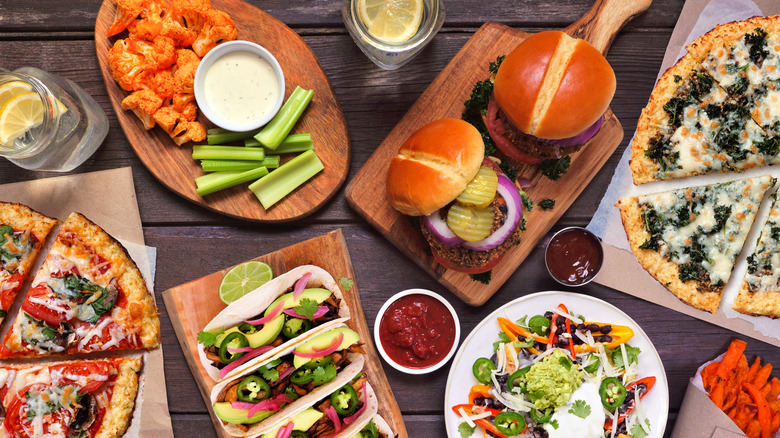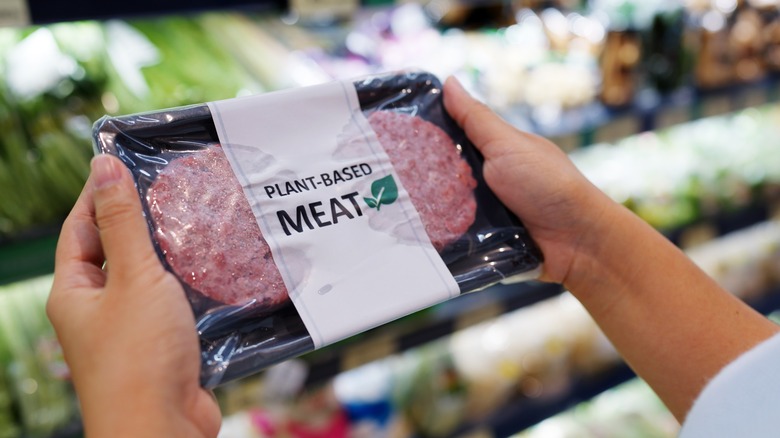Why Consumers Might Be Pumping The Brakes On Plant-Based Meat
Plants make the world go 'round, sustaining life for humans, animals, and insects while releasing oxygen through photosynthesis, absorbing carbon dioxide from the atmosphere, regulating water cycles, and providing soil stability through their roots, per Michigan State University. As if that's not enough, plants also happen to taste good. It's no wonder that plant-based foods have surged in popularity since the introduction of healthy new dietary options. But is the trend sustainable during turbulent times of pandemics and food inflation?
That's exactly what industry research, surveys, and reports aim to reveal, based on current statistics and global conditions. As it turns out, certain segments of the plant-based alternatives (PBA) market continue to thrive while at least one segment is either stagnating or trending downward, explains Foodbeast. That would be plant-based meats, once considered the darlings of PBA fame. The questions are whether consumers are really pumping the brakes and why, and if it's only a temporary change due to extenuating circumstances.
Multi-pronged pricks to plant-based meats
It would be easy to toss out a simple causation for the slight market-share tumble in plant-based meats – but the truth shows multifaceted factors. And their impacts are far from foregone conclusions. As noted by the Good Food Institute, the plant-based meats category rose by 45% in 2020 and exceeded the billion-dollar mark, soaring past expectations and cementing its prominence in the overall world of PBA products. Though 2021 didn't show a tumble, it did fail to continue its explosive growth, instead holding a steady sales pattern. In other less-volatile times, that may indicate disenchantment by consumers – but mitigating factors are certainly worth consideration.
One reality check comes with comparisons: During the early pandemic years, animal-based meats suffered from supply chain issues, giving plant-based alternatives a leg up simply due to availability. This accounts for some of the extraordinary and rapid 45% increase, so it's possible that the industry is simply settling into more normal buying patterns.
However, Deloitte points out that plant-based meats generally cost more than traditional meats, and the current inflationary grocery costs leave shoppers less willing to shell out for premium-priced foods. The tables have also turned on supply-chain issues, with the Good Food Institute revealing a decrease in the availability of common production ingredients such as yellow peas from the world's largest supplier, Canada.
Perceptions and economics
Perception is a power player in consumer choices, and food is no exception. With a desire for healthier lifestyles, many choose plant-based alternatives strictly for perceived health benefits. But, according to Deloitte, not all plant-based meats are equal in nutritional value, and some buyers feel they were tricked, leading to an 8% decrease in overall consumer perception of the product. Some restaurants also report customer bias, with "traditionalists" bucking what they consider a "woke" trend of meatless alternatives, per Foodbeast.
Economics sometimes outweighs social impact, even with important topics such as environmental concerns. Science Daily estimates that replacing animal-based burgers with plant-based ones could lower greenhouse gas emissions by as much as 98%. That's a substantial win for Mother Earth, but at what cost? Jobs, as it turns out. Millions of workers depend on the cattle industry and beef production for their livelihoods, explains The Lancet, including ranchers but also butchers, farmhands, veterinarians, feed suppliers, and more. The growing trend toward plant-based meats could reduce animal supply needs by up to 12 million.


